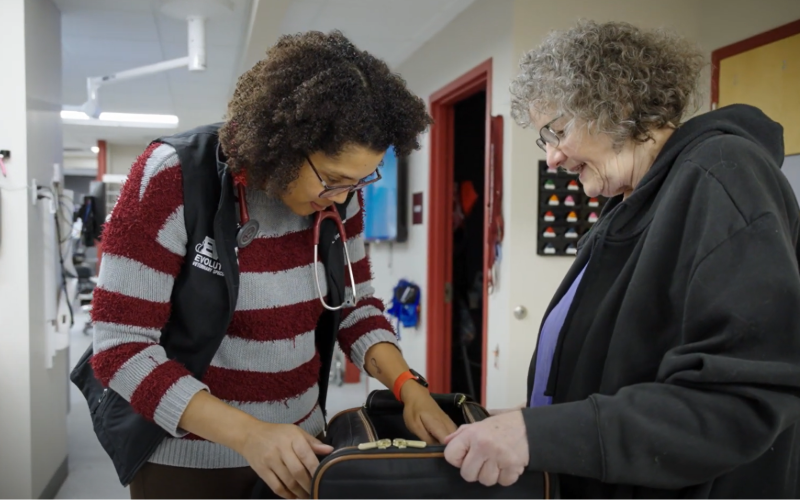Why More Vets Recommend CT Scans For Dogs During Diagnostic Evaluations}
Checking Out the Vital Services Offered by a Vet Cardiologist: Recognizing Ultrasound and CT Check Methods
Veterinary cardiologists play a vital duty in the health and wellness of pets by detecting and dealing with various heart problems. They use sophisticated imaging techniques, such as heart ultrasound and CT scans, to supply precise evaluations. Each technique has its distinct benefits and applications. Recognizing these techniques is essential for pet dog owners seeking the best look after their buddies. What factors should pet dog owners consider when selecting between these diagnostic tools?

The Duty of Vet Cardiologists in Pet Medical Care
Vet cardiologists play an important duty in the medical care of pets, concentrating especially on diagnosing and treating heart-related problems. They have specialized training that allows them to translate complicated analysis examinations and recognize numerous cardio concerns. These professionals use sophisticated methods, such as echocardiography and electrocardiography, to examine heart feature and framework accurately.Veterinary cardiologists additionally establish customized treatment plans that may include drugs, way of living alterations, and, in some instances, medical treatments. Their expertise includes enlightening pet dog proprietors regarding heart health and wellness, emphasizing the importance of normal exams and very early detection of potential problems. Cooperation with basic veterinarians is vital, as it ensures detailed take care of animals with thought cardiac concerns. By supplying specialized services, veterinary cardiologists greatly boost the lifestyle for animals and provide assurance for their owners, reinforcing the relevance of heart health and wellness in total pet dog wellness.
Common Heart Problems in Pets
Usual cardiac issues in animals can greatly influence their health and wellness and lifestyle. Heart whisperings, different kinds of cardiomyopathy, and hereditary heart problems are amongst the most prevalent problems that veterinarians encounter. Board Certified Veterinary Cardiologist. Recognizing these problems is essential for pet dog owners to assure timely diagnosis and ideal treatment
Heart Murmurs in Pets
Heart murmurs can be a source of issue for pet dog owners, they are not constantly indicative of severe wellness issues. A heart murmur is an uncommon sound created by stormy blood flow within the heart. In family pets, these whisperings can be brought on by different aspects, consisting of congenital heart problems, shutoff issues, or even anxiety throughout examinations. Numerous animals with heart whisperings lead typical lives without substantial wellness impacts. To determine the underlying cause, vet cardiologists commonly use analysis techniques such as echocardiograms and Doppler ultrasounds. Early detection and evaluation are vital, as they might aid handle any type of possible heart concerns properly. Pet dog proprietors are encouraged to consult their veterinarian for a complete evaluation if a heart murmur is spotted.
Cardiomyopathy Types Explained
Cardiomyopathy encompasses a team of conditions influencing the heart muscular tissue, resulting in jeopardized cardiac function in pet dogs. One of the most usual kinds include dilated cardiomyopathy (DCM), hypertrophic cardiomyopathy (HCM), and restrictive cardiomyopathy (RCM) DCM mainly affects canines, triggering the heart to weaken and enlarge, which lessens its capacity to pump blood properly. On the other hand, HCM is more widespread in felines, defined by the enlarging of the heart wall surfaces, commonly leading to blocked blood flow. RCM, though less usual, happens when the heart muscle mass becomes inflexible, limiting its ability to full of blood. Each kind provides distinct obstacles in medical diagnosis and treatment, demanding specialized veterinary cardiological assessment to ensure peak management and look after impacted pet dogs.
Congenital Heart Flaws
Congenital heart issues represent a considerable category of heart issues in pet dogs, unique from gotten conditions such as cardiomyopathy - CT Scans For Dogs. These defects are architectural irregularities present at birth, impacting the heart's regular function. Usual types include license ductus arteriosus, ventricular septal defects, and pulmonic constriction. Symptoms may differ widely, varying from light to severe, and can include workout intolerance, coughing, and difficulty breathing. Early diagnosis via advanced imaging strategies like ultrasound is crucial for effective monitoring. Veterinary cardiologists play a crucial duty in identifying these conditions and advising appropriate therapy options, which may consist of clinical administration or medical treatment. Identifying congenital heart issues enables much better end results and boosted quality of life for impacted pet dogs
Understanding Cardiac Ultrasound: Exactly How It Works
A considerable number of vet practices now utilize cardiac ultrasound as a necessary analysis tool for examining heart wellness in pets. This non-invasive strategy utilizes high-frequency audio waves to produce pictures of the heart's framework and feature. Throughout the treatment, a vet professional uses a gel to the pet's chest and uses a transducer to give off ultrasound waves. These waves bounce off the heart and surrounding structures, generating real-time images on a monitor.Veterinarians can evaluate various aspects of cardiac wellness, consisting of look at this web-site chamber dimension, wall surface activity, and shutoff function. Additionally, cardiac ultrasound permits the discovery of problems such as liquid buildup and genetic heart flaws. This method is important for diagnosing conditions that may not be noticeable this article via typical radiographs. By providing thorough details regarding the heart's anatomy and efficiency, heart ultrasound aids in formulating reliable therapy plans for animals enduring from heart illness.
The Significance of CT Checks in Diagnosing Heart Issues
Exactly how do CT scans enhance the medical diagnosis of heart problems in veterinary medication? CT scans supply comprehensive cross-sectional photos of the heart and bordering structures, permitting veterinarians to visualize intricate anatomical connections. This imaging method is particularly valuable in identifying genetic heart problems, cardiac lumps, and abnormalities in capillary. By utilizing innovative imaging algorithms, CT scans can analyze heart chamber dimensions and function, offering a detailed view that might be challenging to attain with conventional methods.Additionally, CT angiography can envision blood circulation and identify areas of constriction or obstruction, which is vital for intending prospective treatments. The rate and precision of CT scans likewise facilitate quick medical diagnoses, vital in emergency situation circumstances. Inevitably, the incorporation of CT checks right into veterinary cardiology considerably boosts the accuracy of diagnoses, allowing targeted therapy strategies and improving client end results for pets experiencing heart disease.
Contrasting Ultrasound and CT Check Techniques
While both ultrasound and CT scans are vital devices in veterinary cardiology, they provide unique benefits and constraints that affect their usage in diagnosing heart disease. Ultrasound, or echocardiography, supplies real-time imaging of the heart's structure and function, enabling vets to examine heart chambers, valves, and blood flow. It is especially reliable for reviewing conditions like heart disease and cardiomyopathy. Ultrasound may be limited in imagining certain anatomical frameworks due to person dimension or obesity.In comparison, CT checks deal thorough cross-sectional photos of the heart and bordering cells, making them optimal for determining structural abnormalities, tumors, or vascular concerns. Although CT scans offer extensive insights, they require sedation and might entail radiation exposure. Eventually, the choice in between ultrasound and CT checks depends on the specific professional situation, the person's problem, and the information required for a precise diagnosis.
Therapy Choices Available Via Vet Cardiology
Vet cardiology offers a range of therapy choices tailored to resolve different heart conditions in pets. Treatment strategies commonly begin with way of living adjustments, including diet plan changes and workout adjustments, why not try these out intended at enhancing overall heart wellness. Medications play an essential function, with cardiologists suggesting medications such as diuretics, beta-blockers, and ACE preventions to boost and manage signs cardiac function.In a lot more extreme situations, interventional treatments, such as balloon valvuloplasty or stent placement, may be essential to minimize clogs or enhance blood flow. For particular congenital heart flaws, surgical choices might be explored to remedy architectural issues. Furthermore, recurring monitoring and follow-up care are necessary components of a complete therapy plan, enabling prompt changes based on the animal's action to treatment. Overall, veterinary cardiology focuses on providing effective, personalized care to enhance the health and wellness and health of pet people with heart conditions.
How to Prepare Your Animal for a Heart Analysis
Preparing a pet for a cardiac assessment is vital to assure exact outcomes and a smooth procedure. Proprietors should first set up the consultation with the vet cardiologist and review any kind of details needs or worries. It is a good idea to hold back food for a minimum of 12 hours before the examination, as this assists improve imaging high quality during procedures like ultrasound or CT scans.Additionally, maintaining a tranquil setting on the day of the consultation can assist decrease the pet dog's anxiousness. It is helpful to bring along any type of appropriate medical records, consisting of previous examinations and medicines (Board Certified Veterinary Cardiologist). Owners need to additionally ensure that their animal is comfortable and leashed throughout transportation to the facility. Familiarizing themselves with the evaluation procedure can assist and minimize worries in asking educated concerns throughout the examination. By following these actions, owners can add significantly to the performance of the cardiac examination
Regularly Asked Inquiries
The length of time Does a Cardiac Ultrasound or CT Check Take?
The duration of a heart ultrasound normally ranges from 30 to 60 mins, while a CT check may take about 15 to 30 minutes. Variables such as the patient's problem can affect these time estimates.

Exist Any Risks Connected With These Analysis Treatments?

Can I Stay With My Animal During the Treatment?
The vet facility's policy typically dictates whether animal owners can remain during procedures. While some clinics encourage proprietor presence for convenience, others might need separation to assure security and optimal conditions for diagnostic imaging.
How Much Do These Diagnostic Examinations Commonly Price?
The costs of analysis tests, such as ultrasound and CT scans, usually vary based upon area and facility. Usually, costs range from a few hundred to over a thousand dollars, mirroring the intricacy and innovation involved.
What Is the Recovery Refine After a Cardiac Assessment?
The recovery procedure after a heart analysis includes keeping track of the pet for any kind of instant reactions, ensuring convenience, and limiting exercise. Vets generally offer post-evaluation instructions to lead family pet owners throughout this important recuperation period. Heart murmurs, various kinds of cardiomyopathy, and hereditary heart defects are amongst the most prevalent problems that veterinarians run into. A heart murmur is an abnormal noise produced by unstable blood flow within the heart. Cardiomyopathy incorporates a group of conditions impacting the heart muscular tissue, leading to jeopardized heart function in pet dogs. Congenital heart flaws represent a considerable category of cardiac concerns in pets, unique from gotten conditions such as cardiomyopathy. Ultrasound, or echocardiography, supplies real-time imaging of the heart's structure and function, permitting vets to assess heart chambers, valves, and blood circulation.